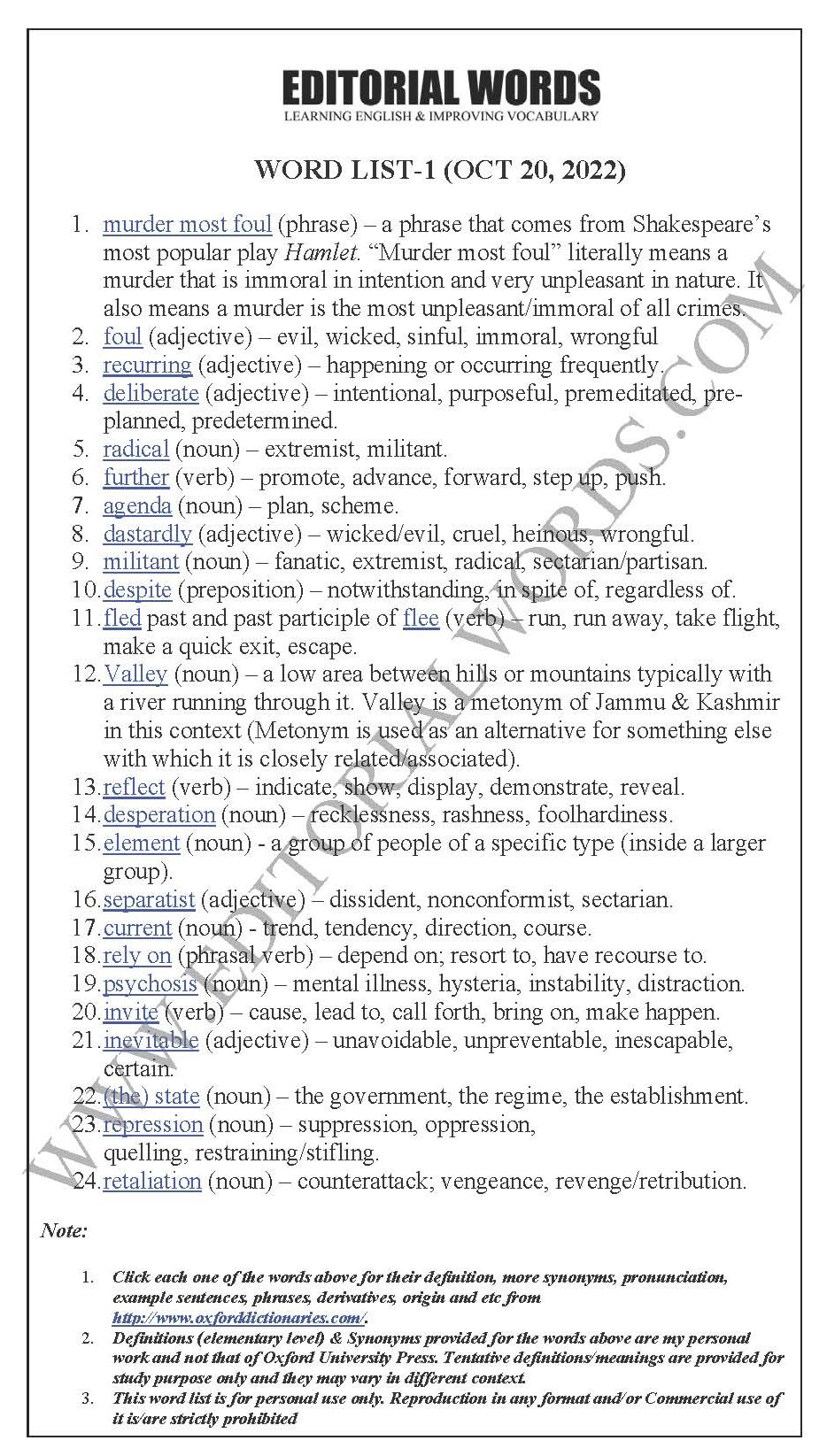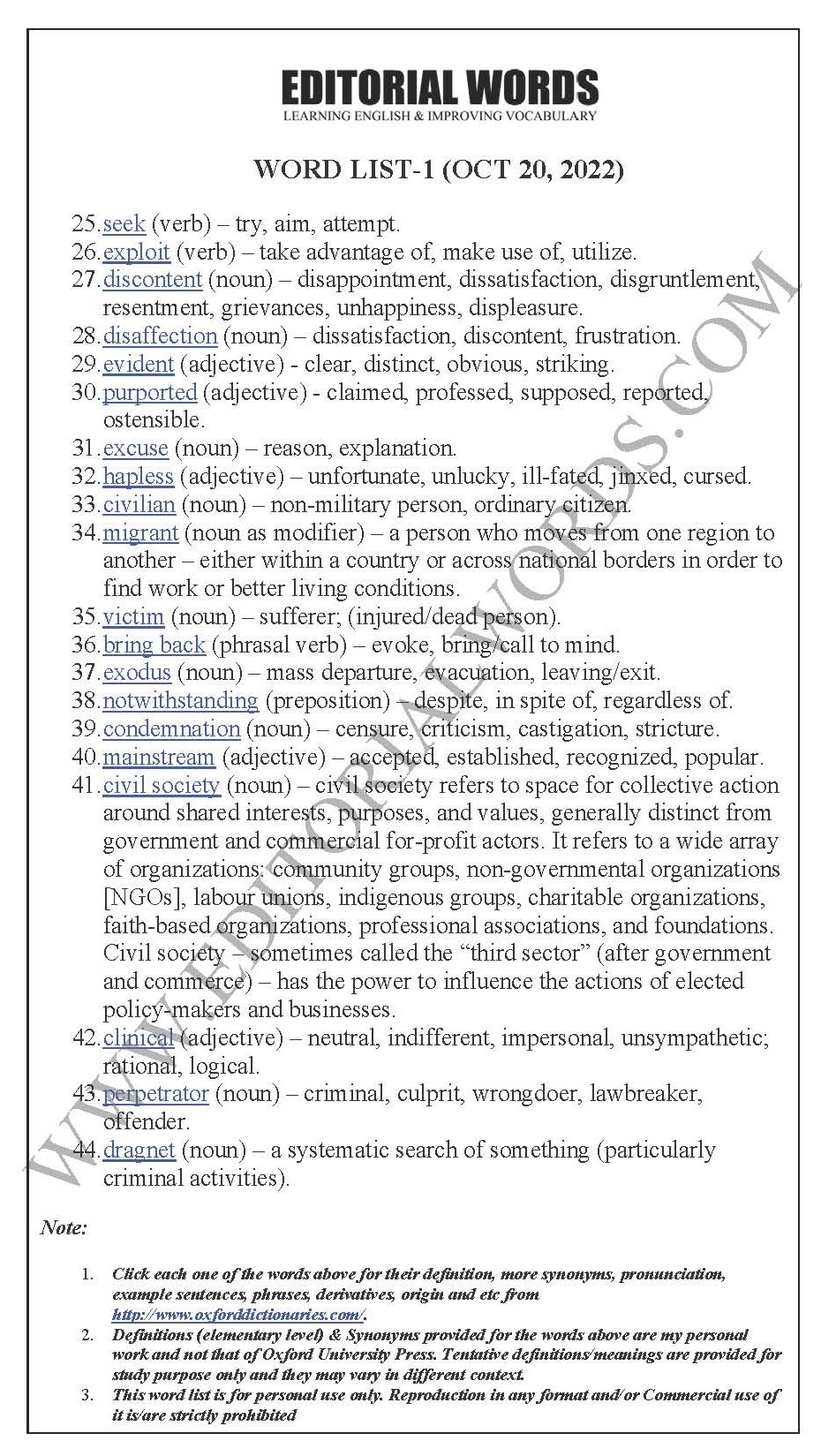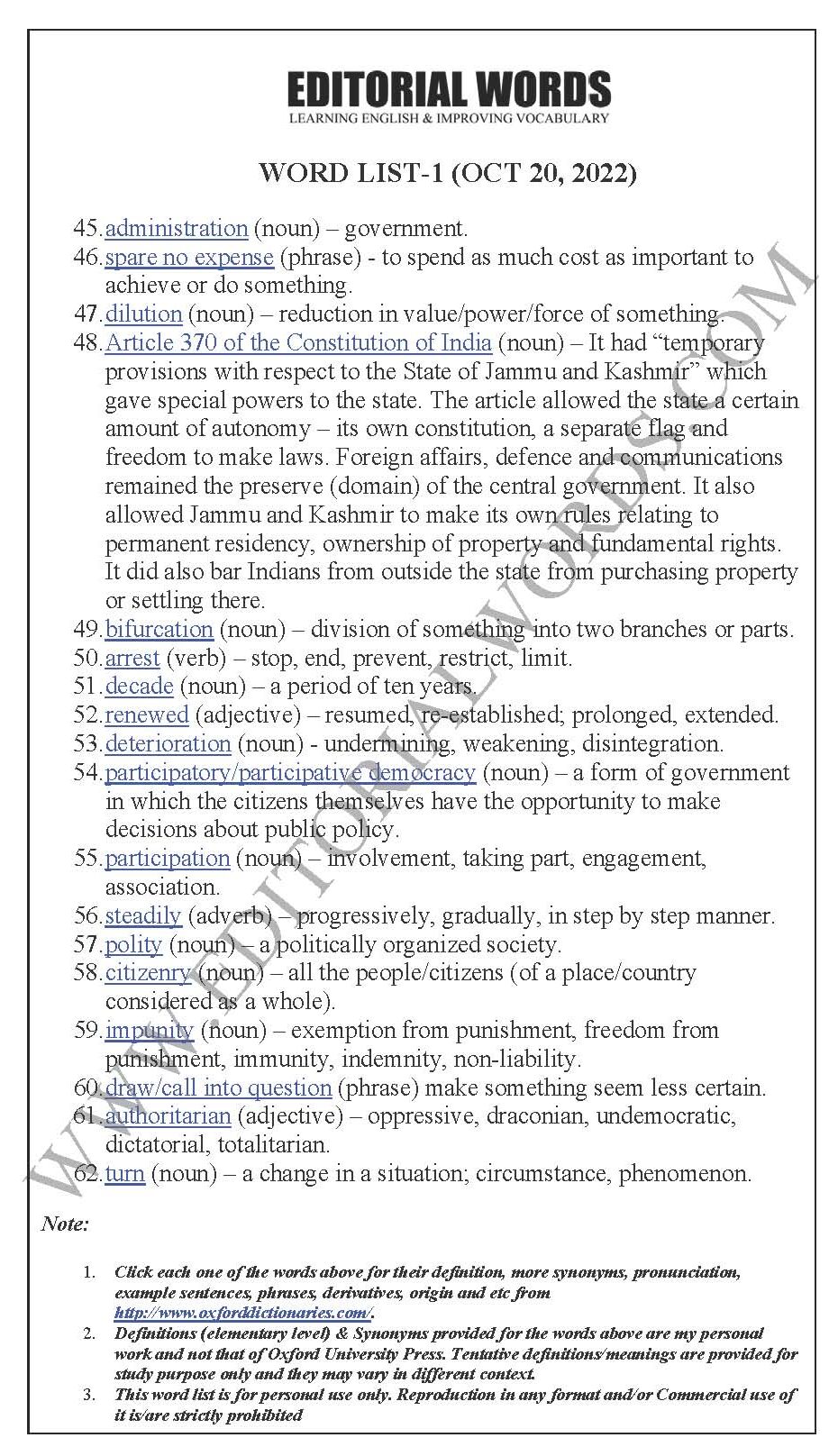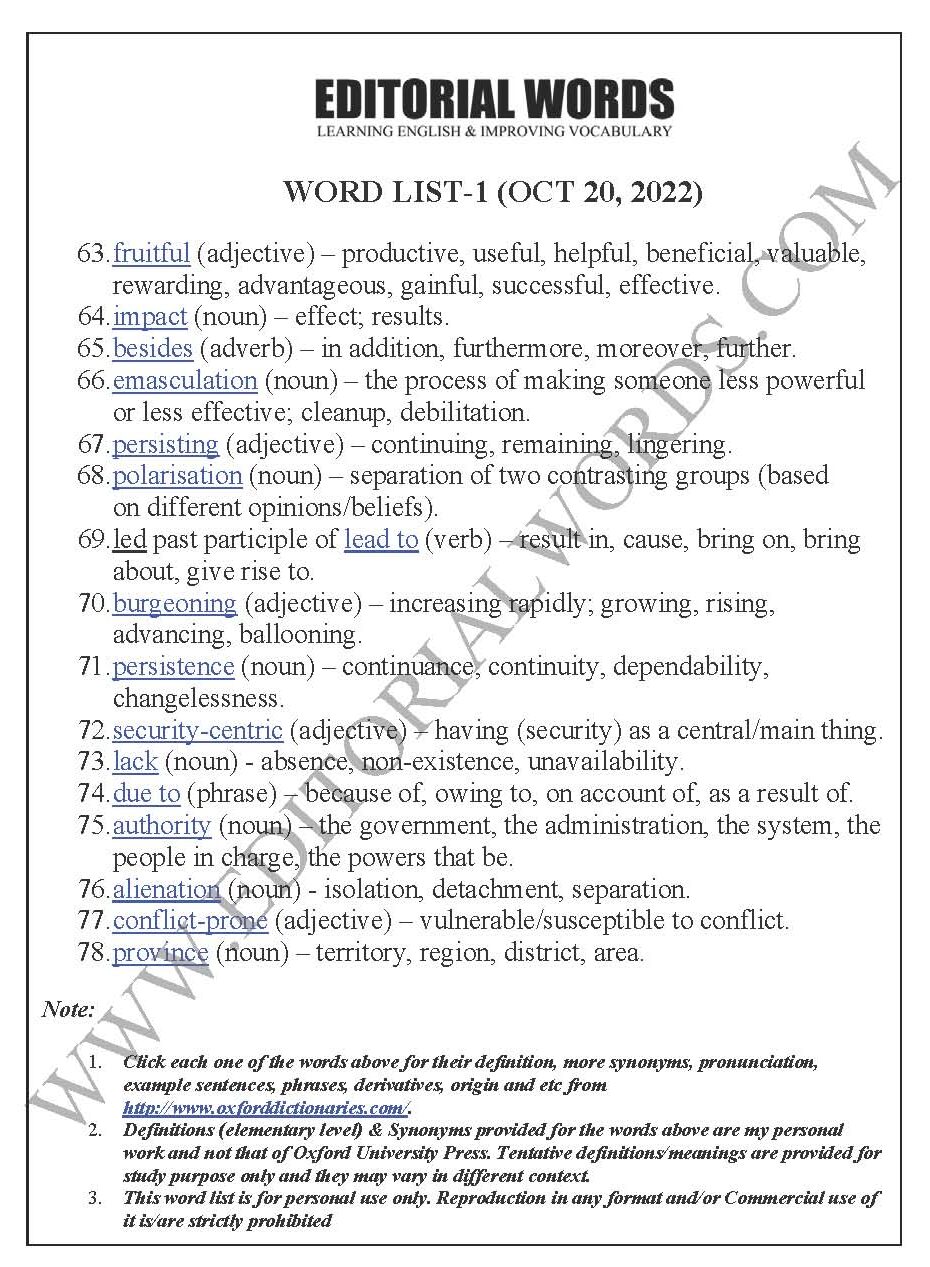The Hindu Editorial (Murders most foul) – Oct 20, 2022
The dastardly murder of a Kashmiri Pandit farmer in Shopian in south Kashmir recently follows a series of attacks on the minority community in the Union Territory (UT),… For further reading, visit “The Hindu”. Below is today’s word list-1 for The Hindu Editorial (Murders most foul) – Oct 20, 2022.
To read this article, click “The Hindu”.
This preview is provided here with permission.
Courtesy: The Hindu
The Hindu Editorial (Murders most foul) – Oct 20, 2022:
- murder most foul (phrase) – a phrase that comes from Shakespeare’s most popular play Hamlet. “Murder most foul” literally means a murder that is immoral in intention and very unpleasant in nature. It also means a murder is the most unpleasant/immoral of all crimes.
- foul (adjective) – evil, wicked, sinful, immoral, wrongful
- recurring (adjective) – happening or occurring frequently.
- deliberate (adjective) – intentional, purposeful, premeditated, pre-planned, predetermined.
- radical (noun) – extremist, militant.
- further (verb) – promote, advance, forward, step up, push.
- agenda (noun) – plan, scheme.
- dastardly (adjective) – wicked/evil, cruel, heinous, wrongful.
- militant (noun) – fanatic, extremist, radical, sectarian/partisan.
- despite (preposition) – notwithstanding, in spite of, regardless of.
- fled past and past participle of flee (verb) – run, run away, take flight, make a quick exit, escape.
- Valley (noun) – a low area between hills or mountains typically with a river running through it. Valley is a metonym of Jammu & Kashmir in this context (Metonym is used as an alternative for something else with which it is closely related/associated).
- reflect (verb) – indicate, show, display, demonstrate, reveal.
- desperation (noun) – recklessness, rashness, foolhardiness.
- element (noun) – a group of people of a specific type (inside a larger group).
- separatist (adjective) – dissident, nonconformist, sectarian.
- current (noun) – trend, tendency, direction, course.
- rely on (phrasal verb) – depend on; resort to, have recourse to.
- psychosis (noun) – mental illness, hysteria, instability, distraction.
- invite (verb) – cause, lead to, call forth, bring on, make happen.
- inevitable (adjective) – unavoidable, unpreventable, inescapable, certain.
- (the) state (noun) – the government, the regime, the establishment.
- repression (noun) – suppression, oppression, quelling, restraining/stifling.
- retaliation (noun) – counterattack; vengeance, revenge/retribution.
- seek (verb) – try, aim, attempt.
- exploit (verb) – take advantage of, make use of, utilize.
- discontent (noun) – disappointment, dissatisfaction, disgruntlement, resentment, grievances, unhappiness, displeasure.
- disaffection (noun) – dissatisfaction, discontent, frustration.
- evident (adjective) – clear, distinct, obvious, striking.
- purported (adjective) – claimed, professed, supposed, reported, ostensible.
- excuse (noun) – reason, explanation.
- hapless (adjective) – unfortunate, unlucky, ill-fated, jinxed, cursed.
- civilian (noun) – non-military person, ordinary citizen.
- migrant (noun as modifier) – a person who moves from one region to another – either within a country or across national borders in order to find work or better living conditions.
- victim (noun) – sufferer; (injured/dead person).
- bring back (phrasal verb) – evoke, bring/call to mind.
- exodus (noun) – mass departure, evacuation, leaving/exit.
- notwithstanding (preposition) – despite, in spite of, regardless of.
- condemnation (noun) – censure, criticism, castigation, stricture.
- mainstream (adjective) – accepted, established, recognized, popular.
- civil society (noun) – civil society refers to space for collective action around shared interests, purposes, and values, generally distinct from government and commercial for-profit actors. It refers to a wide array of organizations: community groups, non-governmental organizations [NGOs], labour unions, indigenous groups, charitable organizations, faith-based organizations, professional associations, and foundations. Civil society – sometimes called the “third sector” (after government and commerce) – has the power to influence the actions of elected policy-makers and businesses.
- clinical (adjective) – neutral, indifferent, impersonal, unsympathetic; rational, logical.
- perpetrator (noun) – criminal, culprit, wrongdoer, lawbreaker, offender.
- dragnet (noun) – a systematic search of something (particularly criminal activities).
- administration (noun) – government.
- spare no expense (phrase) – to spend as much cost as important to achieve or do something.
- dilution (noun) – reduction in value/power/force of something.
- Article 370 of the Constitution of India (noun) – It had “temporary provisions with respect to the State of Jammu and Kashmir” which gave special powers to the state. The article allowed the state a certain amount of autonomy – its own constitution, a separate flag and freedom to make laws. Foreign affairs, defence and communications remained the preserve (domain) of the central government. It also allowed Jammu and Kashmir to make its own rules relating to permanent residency, ownership of property and fundamental rights. It did also bar Indians from outside the state from purchasing property or settling there.
- bifurcation (noun) – division of something into two branches or parts.
- arrest (verb) – stop, end, prevent, restrict, limit.
- decade (noun) – a period of ten years.
- renewed (adjective) – resumed, re-established; prolonged, extended.
- deterioration (noun) – undermining, weakening, disintegration.
- participatory/participative democracy (noun) – a form of government in which the citizens themselves have the opportunity to make decisions about public policy.
- participation (noun) – involvement, taking part, engagement, association.
- steadily (adverb) – progressively, gradually, in step by step manner.
- polity (noun) – a politically organized society.
- citizenry (noun) – all the people/citizens (of a place/country considered as a whole).
- impunity (noun) – exemption from punishment, freedom from punishment, immunity, indemnity, non-liability.
- draw/call into question (phrase) make something seem less certain.
- authoritarian (adjective) – oppressive, draconian, undemocratic, dictatorial, totalitarian.
- turn (noun) – a change in a situation; circumstance, phenomenon.
- fruitful (adjective) – productive, useful, helpful, beneficial, valuable, rewarding, advantageous, gainful, successful, effective.
- impact (noun) – effect; results.
- besides (adverb) – in addition, furthermore, moreover, further.
- emasculation (noun) – the process of making someone less powerful or less effective; cleanup, debilitation.
- persisting (adjective) – continuing, remaining, lingering.
- polarisation (noun) – separation of two contrasting groups (based on different opinions/beliefs).
- led past participle of lead to (verb) – result in, cause, bring on, bring about, give rise to.
- burgeoning (adjective) – increasing rapidly; growing, rising, advancing, ballooning.
- persistence (noun) – continuance, continuity, dependability, changelessness.
- security-centric (adjective) – having (security) as a central/main thing.
- lack (noun) – absence, non-existence, unavailability.
- due to (phrase) – because of, owing to, on account of, as a result of.
- authority (noun) – the government, the administration, the system, the people in charge, the powers that be.
- alienation (noun) – isolation, detachment, separation.
- conflict-prone (adjective) – vulnerable/susceptible to conflict.
- province (noun) – territory, region, district, area.
Note:
1. Click each one of the words above for their definition, more synonyms, pronunciation, example sentences, phrases, derivatives, origin and etc from http://www.oxforddictionaries.com/.
2. Definitions (elementary level) & Synonyms provided for the words above are my personal work and not that of Oxford University Press. Tentative definitions/meanings are provided for study purpose only and they may vary in a different context.
3. This word list is for personal use only. Reproduction in any format and/or Commercial use of it is/are strictly prohibited.
The Hindu Editorial (Murders most foul) – Oct 20, 2022:




“Phrasal Verbs” We Learnt Last Week
“Idioms & Phrases” We Learnt Last Week
“Important Definitions” We Learnt Last Week
Recent Word Lists For The Hindu Editorial Articles

Be the first to comment